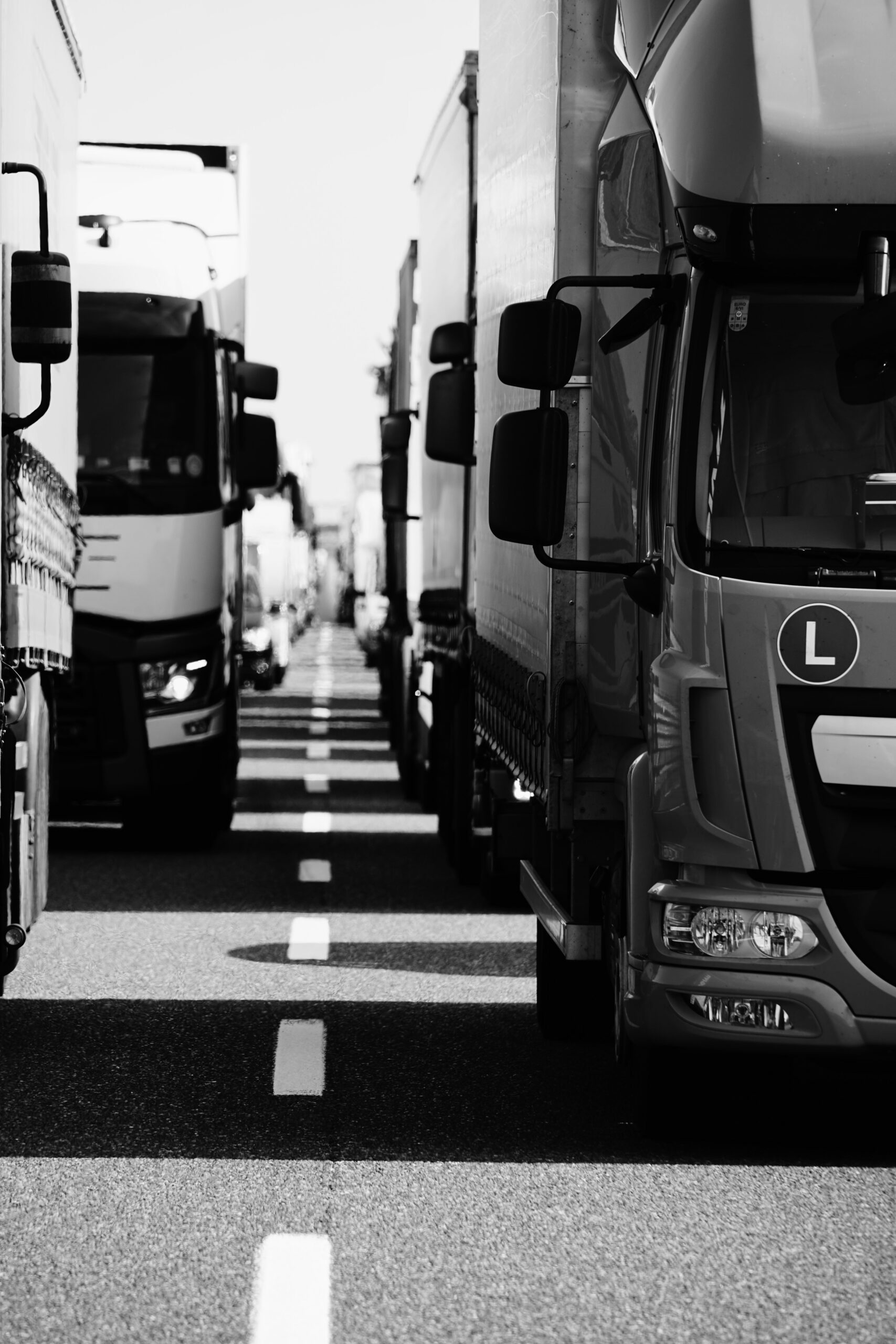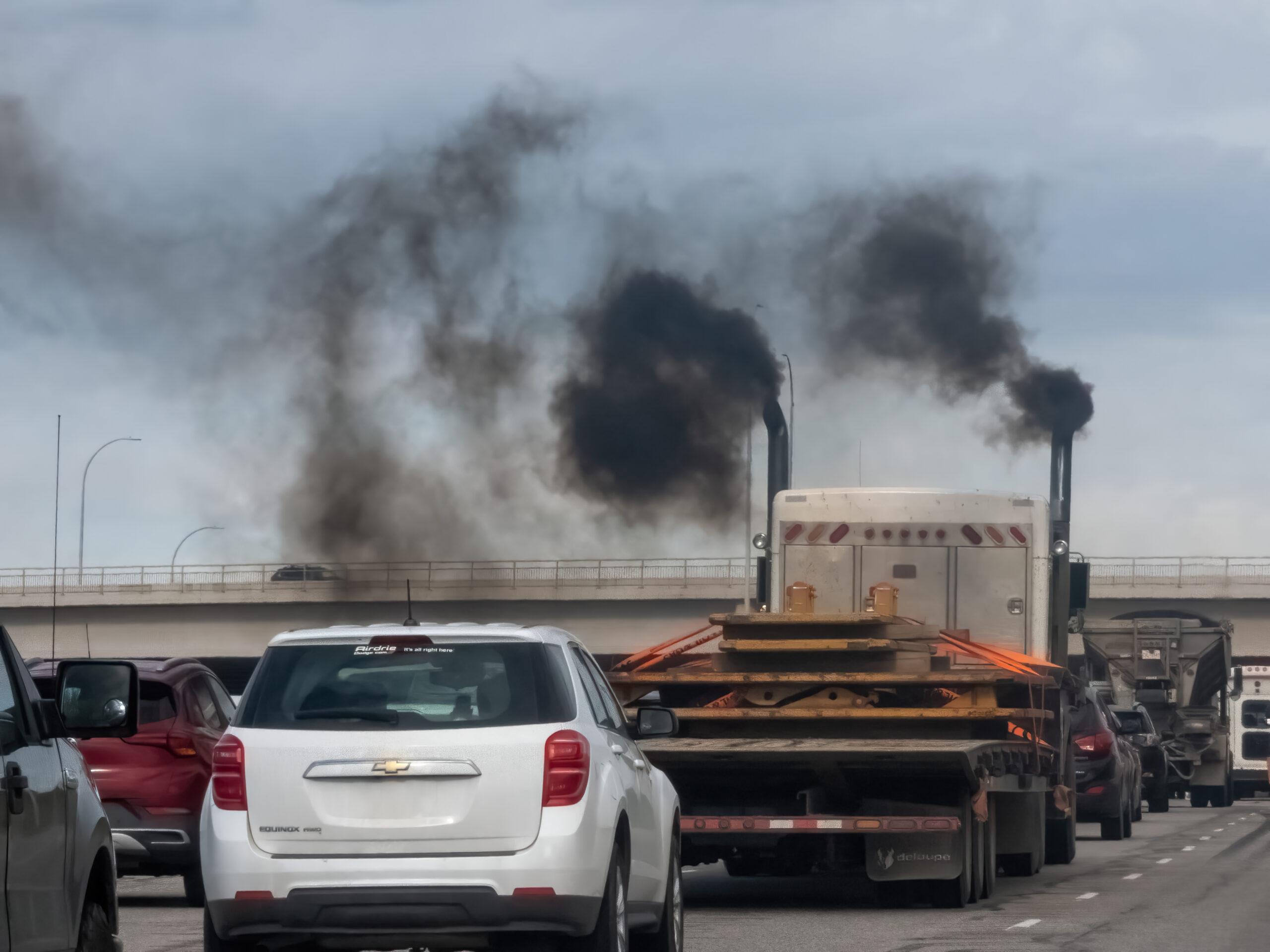Diesel trucks: small share, outsized harm
Diesel trucks represent only 3% of vehicles on the road–but they cause a staggering 86% of NOx and 30% of GHG emissions. The impact isn’t abstract: asthma in kids, missed work days, hospital stays, and 307,000 premature deaths globally by 2040–linked to the diesel trucks sold by just four manufacturers: Daimler Truck, Traton, Volvo Group, and Paccar.
To address this, states in the U.S. adopted the clean trucks rule–a landmark policy that didn’t force an overnight shift but gradually required manufacturers to offer more electric trucks, giving businesses long-term savings and cleaner air for communities. These laws were agreed to by the manufacturers and have been adopted across 11 states such as California, New York and New Jersey which have some of the worst air quality due to truck pollution at concentrated points like ports.
Manufacturers like Daimler and Volvo don’t just dominate the roads–they dominate the debate. Together, they control nearly half the North American truck market with a combined share of 71% (40% and 31% respectively). With that market power comes enormous lobbying influence–power they’ve used not to accelerate the clean truck transition, but to support the delay and dismantling of the strongest clean air policies on the table. When these companies lobby against progress, the whole sector stalls.
Read more about what the clean air rules are here.
Truck makers said one thing and did another
Truck makers publicly claim to support clean transportation– Volvo says it is “moving confidently” towards electrification, while Daimler says they must go “straight forward to zero-emission transportation.” But their actions tell a different story. In 2023, both companies signed a Clean Truck Partnership with California, pledging not to oppose zero-emission vehicle rules. Yet, behind closed doors, they actively worked to dismantle them.
Yet, truck makers pushed responsibility down the chain–forcing truck dealers to buy electric trucks and withholding diesel sales, knowing this would trigger backlash. Sold electric trucks in the U.S. at up to $80,000 more than in Europe, while restricting supply. And whipped up opposition by telling dealers and fleets that the ACT rules were creating shortages–even though the rule applies only to manufacturers. At the same time, they channelled funds through trade associations like the Truck & Engine Manufacturers Association (EMA) and The Transport Project–two of the leading voices behind the push to kill the ACT rule in Congress via the Congressional Review Act (CRA).
What’s at stake when truck makers block clean air progress?
The rollback of the clean air rules has wide-ranging implications–each with real numbers behind the harm.
High fuel costs for drivers
- With fuel prices already squeezing household budgets, rural drivers and long-distance commuters can spend over $500 a month on gasoline–more than 15% of their paycheck.
- Electric trucks offer long-term savings, but repealing the ACT rule slows their rollout, forcing drivers to stick with costly, polluting fuel.
Clean jobs at risk
- The ACT rule had kickstarted investment across 11 states, including California and New York, in EV truck manufacturing and supply chains.
- Repealing it stalls momentum and threatens thousands of future-proof jobs—jobs in building and maintaining the trucks of tomorrow.
Set back for businesses leading the charge
- Industry leaders urged the U.S. Senate to reject the rollback, warning it would jeopardize clean transportation progress, investment, and American competitiveness.
- With over 42,500 zero-emission trucks already on U.S. roads and major fleets gearing up for widespread electrification, repealing the ACT rule punishes early adopters, disrupts long-term planning, and creates unnecessary market uncertainty.
Public health crisis
- Diesel trucks make up just 3% of vehicles, yet cause 86% of NOx and 30% of green house gas emissions.
- Diesel pollution from truck manufacturers are linked to 307,000 premature deaths and $1.4 trillion in projected global health costs by 2040.
- Nearly half of the U.S. population lives with unhealthy levels of air pollution–especially concentrated in port states like California, New Jersey, and New York.
- New Jersey is the most highway-dense state in the U.S. One in three New Jersey residents now lives within a half-mile of a mega-warehouse, facing elevated exposure to freight truck pollution. People living in New Jersey have the second highest levels of cancer risk from diesel soot. In 2023 alone, diesel pollution led to 330 premature deaths.
- In New York people of colour are exposed to 5% more diesel-related pollution than the city average. The Bronx and Queens experience the highest concentrations of diesel-related pollution, especially near major freight corridors. Non-Latino white residents are exposed to 10% less than the average.
What’s next?
Truck makers like Volvo Group claim to support climate action. But when it came time to walk the walk, they stood in the way. Their influence in Washington just helped kill the most ambitious clean air regulation in U.S. history. But the facts haven’t changed:
- ✅ Lower costs: The total cost of ownership for electric trucks is already lower than diesel.
- ✅ Cleaner air, healthier communities: Switching to zero-emission trucks means safer air for families, workers, and frontline communities.
- ✅ A booming market: Automakers leading in EVs are projected to see the highest future profits. The market is projected to exceed $320 billion by 2035–surpassing internal combustion engines.
States still have the power to act. Cities can continue to lead. And people–whether fleet managers, drivers, business owners, or families–can demand better from companies that claim to care about the future. The shift to electric trucks is already in motion. Truck manufacturers can either keep dragging their feet and fall behind–or step up and help drive the transition forward.
Whether you’re a climate advocate, a consumer, an auto worker, a fleet operator, or someone living in a community burdened by pollution–your voice counts. By speaking out against major truck makers like Volvo and Daimler, you’re sending a clear message: we expect action, not excuses.
Call on Volvo and Daimler to stop blocking clean truck rules and lead the way to shifting diesel to electric.
Click the share button on the right or follow us for more updates.



